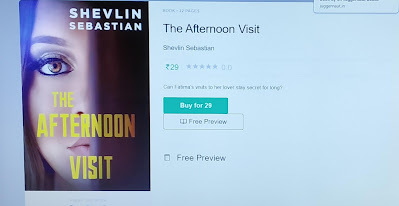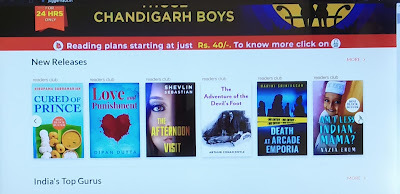Shevlin Sebastian's Blog, page 21
September 13, 2021
Open Vs Closed Societies
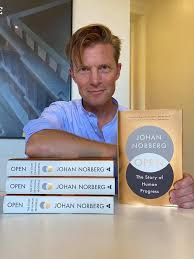

In his thought-provoking book, ‘Open’, published by Atlantic Books, Johan Norberg, a Swedish historian and thinker, has said that a study of human history has shown that societies flourished when it was open and stagnated or collapsed when it became closed. In a closed society, there is a heightened degree of nationalism, an Us Vs Them mentality and the stifling of all critical voices.
As authoritarianism grows all over the world and with the advent of snooping software that penetrates into the deepest levels of a person’s life, Johan’s book is an important reminder of the dangers we face.
A section of the blurb: From Stone Age hunter-gatherers to contemporary Chinese-American relations, Open explores how across time and cultures, we have struggled with a constant tension between our yearning for co-operation and our profound need for belonging.
Here are some quotes from the book:
The government’s role in an open society is to protect the search for better ideas, and people’s freedom to live by their individual plans and pursue their goals through a system of rules applied equally to all citizens.
We all have psychological predispositions that push us towards tribalism, authoritarianism, and nostalgia, especially when we are threatened by recessions, foreigners or pandemics.
By glorifying conquest and national superiority an unceasing culture of blood thirst has emerged that will end up undoing civilisations and will surely end in blood and tears.
Openness makes us uncomfortable and we search for a kind of certainty and belonging that freedom does not guarantee.
Two-thirds of the average person’s material worth is determined by where in the world they happen to work. If people were allowed to move to the place where their labour is paid the best, the gains to world income would be astronomical.
Mankind has always been on the move. We have always searched for a better climate, richer soil, or mate. We have always tried to escape hunger, troublesome neighbours and violence.
Groups that are too similar are afflicted with group thinking.
Fire grew our brains since cooked food releases more nutrients than raw food.
August 22, 2021
Some thoughts as I saw myself in a news video
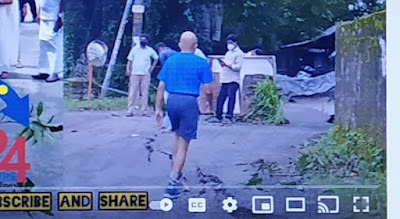
By Shevlin Sebastian
When my sister sent a 6:49 minute video from Nanma 24 Channel, I clicked on it. So imagine my shock, when, at the 2:21 minute mark, I found myself in the video walking in a blue T-shirt, shorts and sneakers.
This was what happened. In the evening, as usual, I had gone to Attipetty Nagar for my evening jog, but found a barrier right at the entrance. So I stopped, parked my two-wheeler and walked through. I noticed a man holding a microphone in his hand.
I also observed large perpendicular cracks in the road, next to the Edappally canal, and assumed some road repair was going on.
But that was not true. The road was in the first stages of collapse. The mud beneath it had shifted, thanks to recent rains, and according to the voice-over in the news video, the road could cave in at any moment.
It was an odd feeling to watch myself from the back. I thought I looked a bit fat around the hips. But, when I sent it to a friend, known for her reassuring remarks, she assured me I looked fine. When I enlarged the image, I realised she was right.
It also raised a question for me: what do people think about me when they see me from the back and the front? What conclusions do they come to?
Recently, an aunt of mine met a few friends of hers who had seen me run. They told her they thought I was from North India.
This is partly true since I have spent many years in Calcutta.
One of them added, “Why does he have to run so much? And so fast?”
What do I think of my running?
I am not running very fast. It takes about 600 metres before I can feel my creaking joints get into some sort of rhythm.
So, what I think of my actions, and what others think of it may be the opposite.
It could be a revelation if you were to ask people: what do you think of me?
I also observe people even as I run, my mouth agape, gasping for breath and sweat dripping down my face: So, is that thirty-something couple married? They talk so much. Do married couples speak so much? Not in my experience. Why do they walk slowly? How can there be any physical benefit if they do not put the heart under strain? You need to walk fast, and pant a little if you want to gain something from this walk.
But after their walk, I am sure they would have felt they had done a good bit of exercise.
Another couple in their seventies: I always hear constant bickering between themselves as I speed past them. Looks like all affection and love have been burnt out.
What about the girl in her late twenties in a T-shirt and track pants? Does she not have any friends? Why does she always come alone? Is she married? Or divorced?
What about the pony-tailed woman, a mother of two sons who ride cycles? She is always speaking to somebody on the phone, through her earphones. So I think, ‘Who is she talking to? A woman? A man? Her mother? A colleague? A lover?’ Sometimes I think, ‘Have never seen her husband at all.’
She could say the same thing about me.
This analysis is happening both ways.
One day, a man stopped me and said, “Are you a doctor?”
“No,” I said.
“Oh, a lady walker told me you are a doctor,” he said.
So we spoke. And he was a priest. I would never have guessed that because he was in a collarless T-shirt and denim trousers.
A young nursing student stopped me and said, “What is your name?”
My first name is very unusual in Kerala. So, they play the word over in their minds and nod imperceptibly.
“You run very well,” she said.
“Thank you,” I said.
But do I?
The standard is so low in our state and country. So few do any exercise. So, if someone does a bit, it’s considered great. My cousin from Chicago told me he runs 10 kms a day. So that put me in my place .
Another walker, Rafiq (name changed), a successful entrepreneur, in his early thirties, also put me in my place.
“For a runner, you do have a paunch,” he said.
I looked down at my stomach, not very big, but felt embarrassed by what he said.
I took it as a challenge.
I immediately cut sugar and rice from my diet. Astonishingly, two months later, my stomach is nearly flat, my trousers have become loose, and I had to increase the notches on my belts.
So happy for that put-down by Rafeeq.
I was about to say, “You come with your mother?” when he told me, “I come with my wife. You must have seen her.”
I nod, glad that the question about his mother had been stuck in my throat. Since she was wearing a hijab, I could not guess her age.
So, everybody is evaluating each other as we go about our exercises in the evening, trying to keep healthy.
Interesting, the thoughts that came up, as I saw myself for a few seconds in a news video.
August 11, 2021
No heart at all
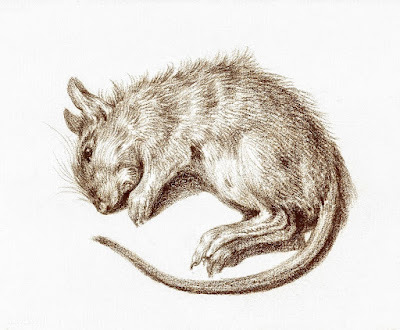
By Shevlin Sebastian
Just a day before my mother returned to Kochi, after five months with her daughter and son, following my dad’s passing away, my wife went to her ground-floor flat to do a clean-up.
In the kitchen, she noticed that in the third drawer of a built-in wooden cabinet, five baby rats were scrambling among the plastic bowls and a couple of rolls of cellophane paper. She pushed the drawer shut.
Later, she told me about it. I wondered what to do. Like my wife, I feel queasy when I see rodents.
I took the help of George, a watchman of a nearby building.
He pulled out the drawer, and we took it to the side of the house.
On the other side, there is a one-acre banana plantation.
“Let’s tip them over,” I said.
“Okay,” he said, and did so.
During the day, the mother rat foraged for food and brought it to the babies at night. It probably chose the drawer because it felt it was a safe place. The house had been empty for so long. Outside, in the grassy land, among the teak and coconut trees, there were numerous frogs, snakes, cats, dogs, and an army of centipedes, scorpions and ants. In short, there were too many predators around. I have seen crows pouncing on these baby rats.
George inserted the drawer back into the cabinet. We began searching for the hole.
It was a mystery. There were no spaces under the doors that led to the outside. We checked the windows. They all had wire meshes. But in the work area, beside the kitchen, as George removed a bucket on a cement ledge, there was a circular hole that led to the outside. I assumed it was made to put in the pipe of the washing machine so that the water could run out.
He rolled a piece of thick cloth and pushed it in a few inches. It was now tight and blocked.
“The rat will get the smell of her babies, as soon as she comes near the wall,” said George. “It will not come inside anymore.”
I thanked George, gave him a cash token, and he left.
The next morning, when I came in, I got a shock. The cloth had been pushed aside. I called George. He looked surprised, as he stared at the hole.
“It looks like because of the rains, the mother could not detect the smell of her babies,” he said. “There is also the possibility the crows ate the babies one by one. The mother assumed the babies were in the drawer. She must have made a supreme effort to push the cloth away, to get at her babies. That is the power of the motherly instinct. Since animals live in close touch with nature, they have more intense feelings than us. It is more genuine too.”
Indeed, it would have taken hours to push aside the cloth.
I can imagine the devastation the rat must have felt to see all her babies had vanished. She must have realised she made a horrific blunder by sheltering the babies inside a human habitation.
George stepped outside.
He took a small stone and placed it at the entrance of the hole.
“Because the mother has lost its babies, there is little chance it will come back again,” he said.
He turned out to be right. The stone remains where it is.
And we stone-hearted human beings remain where we are.
We have re-confirmed to the mother rat and her friends we are the most heartless and cruellest beings on the planet.
August 10, 2021
An erotic short story set in Kolkata
August 4, 2021
Ordinary people doing extraordinary things
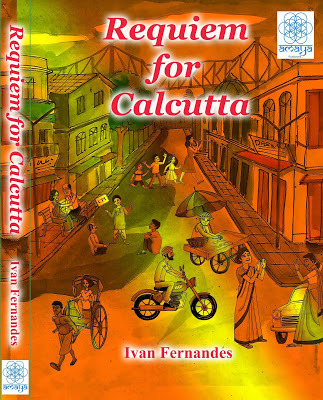
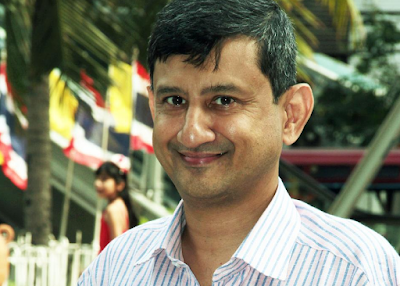
The Calcutta-born and Bangkok-based journalist Ivan Fernandes has written a memorable collection of short stories called ‘Requiem for Calcutta’
Pics: The cover; author Ivan Fernandes
By Shevlin Sebastian
During the years I lived in Calcutta, I would frequently travel through Free School Street on my way to work at the Sportsworld office, near Chittaranjan Avenue. And always, I would go past a huge garbage dump. Expectedly, I took a deep breath moments before, pushed a handkerchief against my nose, and went past.
I always wondered about the group of people who lived in huts right next to the dump. How did they stay next to such filth? Did they get used to the smell? Did it make them sick? It seemed like torture to me.
When I began reading ‘Requiem for Calcutta’, a book of short stories by the Calcutta-born and Bangkok-based journalist Ivan Fernandes, I got some of the answers. In a short story titled, ‘The Sex-Crazed Hijra’, Ivan highlights the life of Kiran Mausi, a Bihari eunuch, who stayed next to a rubbish dump in Howrah.
Here is his description:
‘Here at least 1000 tons of garbage is heaped daily…
‘An NGO has reported that 80 per cent of the approximate 10,000 strong squatter community had inhabited the place for at least five generations....
‘Without going into details, one can imagine the quality of life here with its inhuman living conditions, unbelievable poverty, crime, vice and exploitation. This dumpsite is also home to a group of hijras, for whom Kiran Mausi is their undisputed reigning monarch. And so, this is where I first met her, in a stiflingly hot and vomit-smelling tin shed.’
In this memorable collection, Ivan has focused on a wide variety of characters, which is what makes Calcutta such a fascinating place. So, there is Abhra Mazoomder, a fanatic Marxist Bengali, who gets disillusioned as party members gradually lose their idealism and become drunk on power and corruption. The Left Front ruled Bengal for seven consecutive terms, from 1977 to 2011. And they did this by keeping an iron grip on the electorate. So, even if the party workers could not see the way the actual voting took place, they devised ways to figure it out.
As Ivan writes: ‘The telephone booth-style cubicles were only half-curtained off from the top, to hide the way a person stamped the ballot. But you could see the person’s legs. The CPI(M), in the long roll of the ballot paper, was listed at the top. If your poll paper was seen touching the floor, you must have voted Communist, because you let the roll drop to mark X, besides the hammer and sickle at the top.
‘If you voted for the Congress Party, which was towards the bottom of the roll, your ballot paper was seen not touching the floor as you would raise the roll with one hand to stamp it with the other. Then, of course, you were given a sound thrashing on your way home, irrespective of being male or female, young or old.’
In another story, Ivan writes about Colleen Rachael Houghtin, who spent her life looking after dogs. The tale focuses on the Anglo-Indian community. Sadly, this community has dwindled because of constant migration and inter-marriage. But who can forget their zest for life, their simplicity and their God-given talents in so many fields, but most notably in music and sports. Many of my close friends in school were Anglo-Indians.
Some famous Anglo-Indians, who had their origins in Calcutta, include the the singers Cliff Richards and the late Pam Crain, and the hockey player Leslie Claudius, among many others.
Ivan has also written about the Chinese through the life story of — hold your breath — Will Lim Fang Shung Zhangzhao Kan Phin Wun. It’s an unforgettable story with a sad ending. And there is the tale of Raqesh Dalpat Prahladka, a Marwari doctor, who was so inspired by Mother Teresa that he worked for the poor full time. For the Marwari community, which has such prodigious business acumen, to have a member do something like that as his only profession and not make money as the primary occupation, it would have been amazing, to say the least.
In a poignant narrative about Sikh police officer Ekampreet Singh Dindral, who married a Muslim, Ivan’s description of the 1984 anti-Sikh riots in Calcutta following the assassination of Prime Minister Indira Gandhi by her Sikh bodyguards was harrowing:
‘This time we saw Inderjit Singh, the elderly Bank of India durwan from across the street, kneeling in the middle of the road, his clothes torn, and without his turban, his long hair all over the place, his face bloodied, an eye as big as a potato, hands folded begging for his life as a mob of about 50 people pulled at his hair, kicked and beat him to an inch of his death shouting, ‘Sala gadhar madarchod bhosri wala’ (arse f…..g treacherous Sikh, born from a rotten c...t)”
When asked about the title, ‘Requiem for Calcutta’ Ivan said, “It’s a past that I yearn for. It’s a past that I cherished. It’s a past that cannot be replicated.”
The diaspora, which tends to be nostalgic about their homeland, has been enthusiastic about the book. Copies have been sold in the UK, USA, Canada, Australia, New Zealand, but also in lesser-known countries like Cyprus and Malta, as well as in France, Spain, and Italy. “It got a mention in ‘The Telegraph’, Calcutta, by a reader who described it as 'a must read book that takes you back in time,’” said Ivan.
The writing is so vivid that one got the impression these people are real-life figures. Ivan said he wanted to tell a story not only about a single person but also about the particular culture from where he or she came from. “These are ordinary people doing ordinary things in an extraordinary way,” said Ivan.
The book, however, has a drawback. The publisher missed doing the final proofreading corrections. So, readers will have to overlook a few errors. Ivan promises to make it error-free in the next edition.
This is galling for Ivan because he has been a journalist for over two decades. For the past 20 years Ivan has lived in Bangkok, where he is currently the Managing Editor of the online English edition of La Croix, a Paris-based French daily newspaper. It provides content on politics, society, religion, culture, education and ethics.
Asked to compare Bangkok and Calcutta, Ivan said, “Both Calcutta and Bangkok are old cities, with Bangkok tracing its roots to the 15th century. Although never colonised by a European power, Bangkok has powerful European cultural influences. Being a tourist hub, Bangkok has a strong cosmopolitan appeal. Tourists come from all over the world.”
Bangkok also has a large Indian-origin population who are Thai citizens but have kept alive their cultural traditions. “So it’s easy to get Indian food or feel like being part of the local population,” he said. “In both cities, the local people are proud of their language and culture.”
The biggest dissimilarity is development. “While Calcutta and Bangkok can be similarly chaotic with large crowds, street vendors, neighbourhood markets, monsoon flooding, and traffic jams, it’s the social indicators that make Bangkok superior,” said Ivan. “In Bangkok, there is much more development in city infrastructure, transportation, health services, civic amenities, and cleanliness. It has a greater sense of a positive appeal to human dignity that shields poverty rather than wearing it like a badge of honour as done in Calcutta.”
His first book has whetted his appetite. Ivan is now working on a novel that is also set in Calcutta. “I am still grappling with a proper plot structure, characters, the beginning, middle and an end, even though I have already written 50,000 words!” he said, with a winning smile.
July 26, 2021
Memories of my uncle and the ancestral home
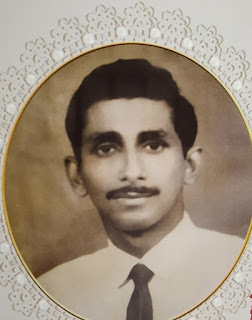
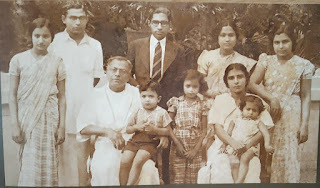
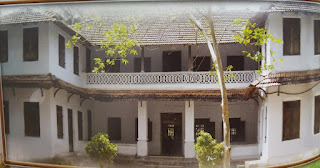

By Shevlin Sebastian
Pics: Mathews Vadakel; the Vadakel family in the 1940s; the Vadakel House; Foliage where the Vadakel House used to exist
Mathew was my mother’s youngest brother. He had come to Calcutta from Kerala in the 1960s to earn a living. He worked as an accountant in a private firm on Chittaranjan
Avenue. On Saturday afternoons, he brought a chocolate bar for me. It was something that I looked forward to. If he was in a good mood, he took me for a spin on his motorbike.
He drove fast, and I had to cling to him, my arms around his stomach, my cheek pressed against his back as I looked sideways at the road that seemed to speed past us. He was a gentle person, silent and calm.
One December evening, in 1969, my parents took my elder sister, a younger brother and me by train for a holiday to Kerala, to meet my grandparents, both from my mother’s and father’s side, to spend time with cousins, to enjoy Christmas and to be in touch with our roots.
My uncle stayed behind.
Unfortunately, it turned out to be the worst Christmas for us. On December 24, my uncle had gone for a celebration with a few of his friends at a bar on Amherst Street. After midnight, Mathew was returning with two other friends on his bike. On Chittaranjan Avenue, he had to swerve abruptly to avoid a car and hit a lamppost at full speed. He rose several feet up in the air and landed in a crumpled heap on the pavement. His friends suffered injuries too. But my uncle had suffered a fatal head injury and died a few hours later at a hospital.
When the news reached Kerala, it was like a thunderbolt. Who could have imagined that my 24-year-old uncle, so alive and lively, was dead? For my grandmother, it was the biggest shock of her life because Mathew was her favourite child. At a family meeting, they decided that my father and grandmother would go to Calcutta for the funeral. We stayed behind — my mother and the children.
My mother told me to pray for Mathews Uncle’s soul. So, I knelt in front of a framed picture of Jesus Christ, a white halo behind his bearded face, hanging on the wall in my grandmother’s house, and prayed for the soul of my dear uncle.
But my grandmother took years to recover.
On every Christmas Eve, she took out his blood-spattered maroon pullover, which she had brought back from Calcutta and cried over it. I still remember the pullover with its dark bloodstains. Sometimes, she cupped my face in her palms and said, “You look just like him.” This could be true. All my relatives said that I had the face-cut of my mother.
My grandmother lived in a large house that her husband had built in the town of Muvattupuzha. On the ground floor, there was a spacious hall, with four bedrooms on the left and the right, a bathroom, a dining hall, a kitchen, a verandah, and a room where she stored her food stuff.
On the first floor, there was a large hall devoid of furniture. Since the building was shaped like an E, there were two bedrooms on both wings, apart from the bathrooms, one of which was big, almost like a spacious room. In this house, which once housed nine children and was a babble of noise and activity, there was now a silence. The children had grown up, got jobs, married, and moved elsewhere.
My grandmother lived a life of going to church, being active in social service activities and hosting her children when they came home with their growing families for the holidays. My grandmother was very generous. When we would leave to return to Calcutta, she would give me a gift of Rs 100 or Rs 150. In the 1970s, it was a lot of money. I felt so happy, even as I gave it to my mother for safe-keeping.
There were so many memories of that house.
Of how, on hot, silent summer afternoons, I would wander up and down the empty hall and wonder about life and what it meant. Sometimes, I climbed over the balustrade of the balcony and walked by the side, holding onto the railing. I felt scared and thrilled at the same time.
Cousins came over. I remember playing cricket with Joseph in the courtyard. The bat was made of a coconut branch, and it would make a ‘thwack’ sound when you hit the ball. We had good fun.
I also remembered my grandfather, Abraham Vadakel. He was a short, squat man with a broad face. Always dressed in a white shirt and dhoti, he sat on an armchair facing the door. It was open throughout the day, but he could not see. He was afflicted with glaucoma when he was in his mid-sixties, and gradually lost his eyesight.
My grandfather was a man of habit. He got up at 5 a.m., said his prayers, went to the bathroom, had his bath, and later, his breakfast. He had two small round tin boxes on a table placed against the wall near his armchair. One contained cigarettes that had been cut into half, while the other contained sweets.
He had a sweet tooth, so he ate sweets throughout the day. When I was a child, I tried to steal them from the tin while he was sitting there. But he had sharp ears.
“Who is there?” he said in his gruff voice.
Inevitably, I said, “It’s me.”
He smiled and said, “Take a sweet.”
He did not mind me taking sweets, but I had to tell him first. So, it became a challenge for me to take it without him knowing. I doubt whether I tasted ‘sweet’ success more than twice.
My mother would read the newspaper aloud to her father from end to end every morning. This was something she enjoyed doing. Years later, when I would ask her to explain to me a news report, since I don’t know how to read Malayalam, she would start reading it the way she did to her father. I feel bad saying this, but I would immediately interrupt her and say brusquely, “Just give me the gist.”
The dining room in my grandparents’ home was a narrow hall with a large table, with chairs all round. I still remember my grandfather sitting at the head of the table and having porridge in a white bowl. And there were the rest of us, my grandmother, my brother and sister, my mother, and my two aunts who lived nearby.
One aunt, Philomina, was married to an engineer, worked as a professor of biology at a nearby college, and had three children, while the other, a nun, Sr Mary Carmel, was a teacher in a nearby school. While Philomina would later become the head of the department, Sr. Mary ended up as the principal.
All of us sat at the dining table and ate and talked and enjoyed ourselves. A moment frozen in time. Who could have imagined then that deaths in the future — of my grandparents and Philomina — and the march of time would dissolve the scene altogether, never to be replicated.
There was always this unforgettable image at lunchtime: my grandmother would make balls of rice with her fingers, dip it into the curry and throw it straight into her mouth. She had perfected her aim: it always went in without missing.
Outside the dining room, there was a pipe placed over a thick cement slab on the ground. There was no washbasin. When you washed your hands, the water fell on the slab and slid away into the mud of the courtyard. Because of the water falling constantly on it, the slab had green moss growing on the edges.
There was also a golden container, called a kindi, which was like a mug, with a thin, long, curved snout and you filled it up and went to the steps which led to the courtyard and washed your feet, again allowing the water to run off into the mud.
This sandy courtyard was long and narrow. Across from it, there was a cattle shed, with a couple of cows, a hen’s coop, and a bathroom. Now this bathroom was strange: it was a large room, with a tiled roof, the walls painted a light blue, and instead of a commode, there was a hole in the ground. You sat, resting your feet on two upraised cement bricks, and the waste fell quite a distance. Apparently, there were pigs which lived underneath which ate whatever you left them.
In later years, my grandmother installed commodes in all the bathrooms.
My grandmother was the second wife of my grandfather. With his first wife, he had five children, before she died of typhoid at the age of 30. My grandmother was only 20 and my grandfather 45 when they got married. Why did a young woman marry a widower with so many children?
My mother told me there were financial difficulties in my grandmother’s family. So they agreed to this marriage because my grandfather was a wealthy lawyer with a reputation of being a good man. So, my grandmother married my grandfather and began having kids of her own. The first, the eldest, is my mother.
Thereafter, she had three sons and a daughter. Incidentally, two sons followed the footsteps of their father and went into the legal profession. While one, George Vadakel, became a judge of the Kerala High Court, the other, Joseph practised for several decades in the same court.
Years later, my mother told me that her mother never discriminated between the two families. She treated everybody the same. It worked. There was no friction between the two sets of children. This revealed a maturity far beyond her years.
But it must have been a hard life for my grandmother because the age difference was so much, and it must have been difficult to handle such a big household at such a young age. But she managed it well and efficiently. Once, she told my mother that no matter what happened, husband and wife should never argue in front of the children. My mother told me how true it was. In the 18 years she lived with her parents, before she got married, she had never heard them argue. But decades later, when my grandmother was old and trembling, her husband having long passed away, she told my mother it was a difficult marriage and left it at that.
All these memories got triggered when, in September 2020, my aunt Philomina, at age 77, died in Muvattupuzha. My mother and I attended the funeral. On the way back, I stopped the car so we could have a glimpse of the ancestral house.
Imagine our shock, to see that the house no longer existed. Instead, the entire area was blanketed with plants and grass. It was a translucent green because recent rains had washed away all the dust. My cousin had sold the house earlier. And the new owner had kept it the way we remembered it. But it was resold recently.
The newest owner did not find the traditional design useful. So he demolished it. It was a thorough job. Nothing remained.
As I stared at the green expanse, I could feel my heartbeat quicken. It seemed to me a building of memories I had constructed inside me about the house collapsed in the undulating waves of sorrow I felt.
My 85-year-old mother stood next to me staring silently.
There was a look of devastation on her face.
July 19, 2021
The incredible stories of a small town
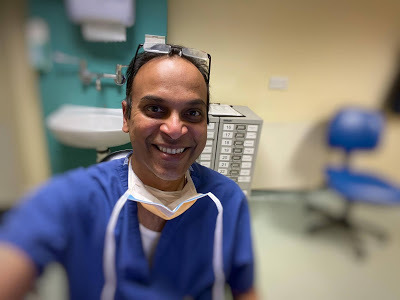
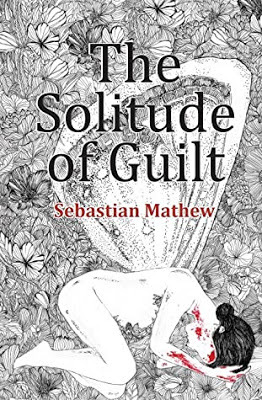
Sebastian Mathew makes a sparkling debut with his novel, ‘The Solitude of Guilt’
By Shevlin Sebastian
One morning, a few years ago, when Sebastian Mathew woke up at his home in Kuwait, he recited four lines of a Hindi poem he had learnt when he was in class six at the St. Joseph’s school in Kozhikode. The poem was about Yashodhara, the wife of Prince Sidhartha who later became Lord Buddha.
“The minute he learns she is pregnant, he walks off,” says Sebastian. “She adjusts to life without him and brings up her son Rahula. But she always has this underlying fear of him returning. There is a lot of turmoil within her about how it would be.”
Yashodhara’s story resulted in a character called Susan forming in Sebastian’s imagination. “Her husband had abandoned her, but now she has the apprehension he is coming back,” says Sebastian.
So, he embarked on a novel. Sebastian wrote for one year and then got stuck. So, he concentrated on his career as an ophthalmologist at the Al-Bahar Eye Centre.
One evening, he was having dinner at home with his family: daughter Naina, son Manav, and wife Tessa.
Suddenly, Tessa said, “Have you given up on writing the book?”
Sebastian said, “No, I haven’t.”
“Then you need to get back to it,” she said. “It’s your passion. You should start writing again.”
So, Sebastian made another attempt. He would sit at his desk daily at 4.30 p.m. and write for two hours. “There were days when I hardly wrote anything,” he says. “Then I would edit the earlier stuff. But on days when I felt inspired, I would write 1500 words.”
The result, after nine years, is the riveting 297-page novel, available of Amazon, called ‘The Solitude of Guilt’. It tells the story of a plantation owner Chandi Mappilla and his family members Susan, Elikutty, Rahul and Susan’s husband Gautam.
The first few lines of the book grab the reader’s attention:
‘I am Rahula.
‘Rahul, snot-face, Big Bore, retard, walking vegetable, cabbage-head, the unfortunate, the ill-omen, the disaster, the accident, the mistake, the silent.
‘It is strange I was born the day my father beat my mother nearly to death. I was born eight weeks early; trauma has a way of setting things in motion. The fact that the foetus survived the assault, and its aftermath was called a “bloody miracle” by Dr Markose, the senior doctor of the village.’
The writing is beautiful and immersive. You feel yourself sinking into the milieu of small-town Kerala.
Readers have responded well. On Amazon, Sandeep writes:
‘A very well-written novel set in Kerala…. each character has been well drawn out, brought to life with vivid descriptions and is sure to strike a chord with you.
‘From the peaceful village of Pullussery to the bustling city of Bangalore and then to the tranquil coffee estates of Madukuzhy, the author has successfully handled the transitions across geographies, just as he has with the generations, with ease.’
Sebastian arrives as a fully formed talent. His voice is assured, confident and resonant.
Asked the meaning of the title, Sebastian says, “We are all alone in our guilt. It is not something we can share. All the main characters have some level of guilt, but they deal with it differently.”
Art student Dia Thomas has done the eye-catching pen drawing on the cover. It captures a naked and pregnant Susan, lying on a forest floor, with foliage all around, her head resting on her palms, while there are bloodstains on the forehead, cheeks, neck and arms. But rising behind her and attached to her body is a butterfly wing.
“It’s a metaphor,” says Sebastian. “She has wings but cannot fly.”
Sebastian is also wondering whether he can fly, too. The world is changing. He knows that the readership is going down for literary fiction. “There is a lot of competition from other mediums, like TV, online, mobile and streaming,” says Sebastian. “There are other avenues for reading, like a blog, for instance.”
The concept of buying a book is going down. Even bookstores are closing down. “Somebody told me that a large bookstore chain like Barnes and Noble in the US is going through a crisis,” says Sebastian. “They are shutting down a lot of their stores. This is a global trend where book-reading is becoming less popular.”
Despite that, the number of writers has increased. “I would say Arundhati Roy’s huge international success with her ‘The God of Small Things’ made a big impact,” he says. “In the last twenty years, there have been many people who have been drawn to the literary genre.”
As a first-time author, Sebastian had a trying time to find mainstream publishers. “Publishers are looking for books that will generate sales,” he says. “What happens to good literature? I am struck by [Kochi-based author] Anees Salim’s story. His first two novels were rejected. But the third one got published. It received rave reviews. Then people looked at the first two. Eventually, these were published, and all three got recognition and awards.”
Sebastian is sure that a lot of good writing is being missed. “But I don’t know what the solution is,” he says. “Maybe, major publishing houses should do something similar to what is there in the business world: corporate social responsibility. So, publishers should have a division which only looks at new writing, vetting unknown talent. The aim is to bring out good literature and not bother about profits.”
Apart from online, the book is available at all Crossword stores across India.
As for his future plans as a writer, Sebastian, who is attached to the National Health Service at Boston, England, is working on a collection of short stories.
July 10, 2021
The story of my great-grandfather
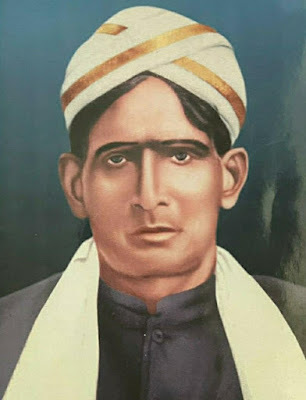
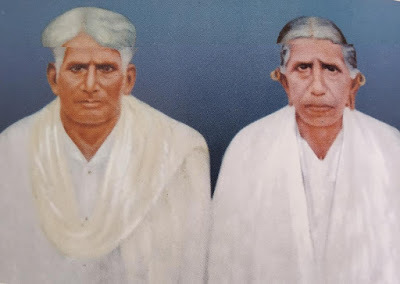
Pics: Ninan Xavier; Ninan Xavier and his wife Thresiamma
By Shevlin Sebastian
When my California-based uncle, Siby Sebastian, put up a photo of Ninan Xavier in our family WhatsApp group, it focused attention on one of our ancestors. This is my great-grandfather from my father’s side. My grandmother’s father. Born in 1862, he died on January 25, 1948. So, he lived to the ripe old age of 86.
My son’s birthday is on January 25. So the question arises: is my son a reincarnation of Ninan Xavier? Who knows? Who can tell?
In the photo, Ninan is wearing a headgear called a Thalappavu. This is a symbol of power and status. It was given to him by the then Diwan of Travancore-Cochin.
I have gleaned most of the information which appears in this post from an article written by my uncle Kurian Sebastian. This was published in a booklet to commemorate the 60th death anniversary of Ninan.
Ninan studied till the second form (Class 8). “This was deemed appropriate for most people at that time,” said Kurian. From his early days, he had a fascination for the flute and joined the choir of the local church at a place called Koothrappally (about 20 kms from Kottayam).
When he was 16, he married a 14-year-old girl called Achamma. A son, Ninan, was born. But a mere 22 days after his birth, Achamma passed away. Later, Ninan married another woman called Thresiamma, and they had six children — two boys and five girls.
Ninan loved agriculture with a passion. Apart from rice, he was one of the first to try rubber cultivation in the village of Madappally. The rubber produced was sent to the Volkart Brothers, a Swiss firm in Cochin, which exported it to different countries. The Brothers established their Cochin branch in 1859.
This regular business with Volkart resulted in an upsurge in the economic fortunes of Ninan. As a result, he developed expensive habits. Ninan would enjoy a couple of pegs of vermouth every evening. This was imported from Britain by the Volkart Brothers.
Along with sacks of Burmese rice, workers who had gone to drop the rubber off by boat would bring these bottles back to Ninan’s house.
Ninan also tried sericulture (silkworm breeding) in 1918. Again, he was one of the pioneers. The Director of Agriculture was a constant visitor to see the progress of the cultivation. From the silkworm produced, several types of clothes were made. This was displayed at an exhibition in Thiruvananthapuram in 1921. He received a medal from the government for his efforts.
He rose in stature. The Diwan visited his house.
Later, he shifted to the construction and repair of roads and became the leading contractor in that region.
Ninan also stood as a candidate for the Changanacherry/Peerumade constituency for the elections to the Sri Moolam Assembly and won. He attended the 23rd session at the Victoria Jubilee Town Hall in Thiruvananthapuram.
Ninan was known as a confident, friendly and outgoing person.
In the 1920s, Ninan’s brother-in-law Kunjadichen attended a public meeting in the town of Changanacherry where PJ Sebastian (my grandfather), a teacher of the well-known St Berchmans school, gave a rousing speech. Kunjadichen met Ninan and told him Sebastian would be a suitable boy for marriage for his daughter Thresiamma. So, Ninan met Sebastian and was impressed.
So was Sebastian. In his autobiography, ‘My Life’ (translated into English by my uncle Dr. C T Mathew), Sebastian writes, “I saw a striking 60-year-old man sitting on the verandah with a large betel nut box in front of him.”
The marriage with Thresiamma took place on June 12, 1922.
In 1937, Ninan attended a session of the Sree Moolam Assembly, but this time he was in the company of Sebastian, who had won from the same constituency.
Sebastian went on to have a stellar career as he became one of the youngest chairmen, at age 29, of the Changanacherry municipal council, an MLA, a Public Service Commissioner and later became Director of Panchayats of the Travancore-Cochin State. He was one of the leaders of the ‘Vimochana Samaram’ (liberation struggle) that resulted in the dismissal of the EMS Namboodiripad Ministry by the Congress-led government at the Centre on July 31, 1959. In his autobiography, Sebastian mentions meeting Mahatma Gandhi with other Congress leaders at Sevagram in 1938. He also won the Tamrapatra, which is an award given for outstanding contribution as a freedom fighter by the Indian government.
So, it was clear Ninan had a good eye for talent.
When Ninan passed away, through special permission from the government and religious authorities, his family buried him inside the Lourdes Matha church at Mammood, instead of the cemetery.
During a period when such concepts were unheard of, Ninan ensured his five daughters got an equal share of his property.
Years later, Sebastian wrote a letter to his eight sons and daughters in which he stated: "It is a fact that your grandfather has given your mother landed properties. You are enjoying these properties, which this good soul has given to your Amma. You should not forget that for the growth and progress of your family members, this wealth has played a cardinal role. Therefore, you should always be thankful and remember him [Ninan] with respect and gratitude."
In the end, Ninan’s was a life well-lived.
Some thoughts about Vidhu Vinod Chopra's book
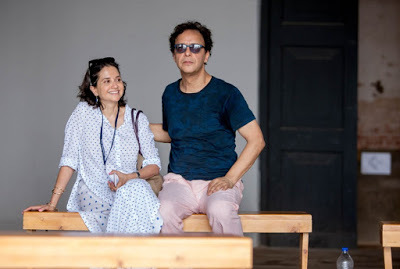
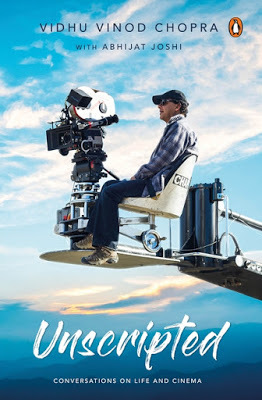
Pics: Vidhu Vinod Chopra and his wife Anupama at Aspinwall House, Fort Kochi; the cover of the book
On March 23, 2017, I was at the Aspinwall House to see some exhibits of the Kochi Muziris Biennale. As I was wandering about, I got a ‘ping’ sound on my mobile. The SMS said that noted Bollywood director Vidhu Vinod Chopa was in the premises with his wife, the film critic Anupama Chopra. So, without further ado, I went in search and found them.
They were both friendly and kind.
As I started chatting, I told Anupama I had read her book, ‘First Day, First Show’.
She beamed.
Anupama is a person who smiles a lot.
But then, I added, “Isn’t that the only book?”
Her smile froze. And she said, “I’ve written others.”
“Okay, sorry, I will definitely check it out,” I said, and brought the smile back to Anupama.
Later, I checked and realised she had written seven other books. This type of slip-up happens when you meet people without doing proper research.
I made the same blunder when I accidentally met the noted psychoanalyst Sudhir Kakar at the same venue and said I had read his path-breaking book, ‘Inner World’. Then, like with Anupama, I made the same blunder of asking whether he had written any more books.
“Yes, I have,” he said, a little coldly.
Later research revealed he had written 24 books, fiction as well as nonfiction.
His wife, the German-born Katharina, was with him and she was also an artist and writer. Didn’t know that. Anyway, thankfully I did not make any blunders about her.
But these were rare-missteps. Nearly always, I researched deeply before meeting the subject.
Two indirect messages are sent.
a) You show respect to the person.
b) The interviewee realises you are dead-serious about the interaction.
This always results in a good interview.
I wrote the piece on Vinod in 20 minutes, to meet the deadline of the features page, which always goes early to press. I went to the media room, borrowed a laptop and wrote it. So there are no surprises, it is a slight piece.
I usually avoid fast writing because I have too much reverence for writing, to do it casually.
Anyway, here is the article:
“The art works are fascinating”
Noted Bollywood film director Vidhu Vinod Chopra talks about his experiences in the Kochi Muziris Biennale, as well as his upcoming film
By Shevlin Sebastian
Bollywood director Vidhu Vinod Chopra breaks out into a smile as he looks into a telescope on a first floor sea-facing balcony at Aspinwall House, Fort Kochi. This is an installation work of the French artist Francois Mazabraud. “Nice,” he says. His wife Anupama, a noted film critic, also breaks into a smile.
“This is my first visit to the Biennale,” says Vidhu, who is clad casually in a blue T-shirt and cotton trousers. “I am obsessed with cinema, so coming here is a liberation for me. I am enjoying an art form which is outside of cinema. And the works I have seen so far have been fascinating. What adds to the charm is the beautiful ambience of Fort Kochi.”
Both Vidhu and Anupama are a playful couple. At the ‘Going Playces’ exhibition of artist Orijit Sen, they took up the challenge of placing pieces with magnet ends into the ‘From Punjab with love’ painting. “Wow, this is cool,” says Vidhu, as he places a piece in the correct slot. Later, both take up a similar challenge in the Charminar exhibit.
Meanwhile, on the career front, Vidhu is putting the finishing touches to his script of his next movie. The theme: the exodus of Kashmiri Pandits, from the 1980s to the present time.
This theme is not a surprise. Vidhu was born and brought up in Srinagar. “Kashmir is very close to my heart,” he says. “The movie is going to be an epic.” The shooting will begin in September. And the locations will be in different parts of Kashmir.
When asked if it is safe, Vidhu says, “I go to Kashmir every year. It is as risky as anywhere else in the world. Maybe, because of the recent terrorist attacks, Paris may be more risky now. Tell me which place is not risky today? That is the world we are living in now.”
He has not selected the cast, as yet. But he is hoping to release it sometime next year. “I don’t worry about the release date,” says the maker of hits like ‘1942: A Love Story’ and ‘Parineeta’. “The film will somehow make its way into the world” (this was ‘Shikhara’, which was released in 2020).
(The New Indian Express, Kochi and Thiruvananthapuram)
Images of Vidhu and Anupama came to my mind when I recently came across the book, ‘Unscripted — Conversations on life and cinema’ by Vidhu with his friend, the scriptwriter Abhijat Joshi (published by Ebury Press in 2021). The duo, along with director Rajkumar Hirani, had produced blockbusters like ‘Lage Raho Munnabhai’, ‘3 Idiots’, ‘PK’ and ‘Sanju’.
This book is an easy read. In my first attempt, I finished about 50 pages of the 180-page book. Essentially, the story is about how a boy from a mohalla in Srinagar made it big in Bollywood after an enormous struggle. This struggle came as a surprise when later, as you read on, you realise Ramanand Sagar, a Bollywood insider, who made the 78-part serial of the Ramayana, that became widely popular, was Vidhu’s half-brother.
But the link helped now and then. When Vidhu applied to the Film and Television Institute of India, at Pune, he seemed to have got in, because two of the judges, the film director Hrishikesh Mukherjee and the writer Krishan Chander seemed to be aware of Vidhu’s relation to Ramanand.
In a free-flowing conversation, Vidhu and Abhijat talk about the films that had a big impact on the former, his first marriage, second and third marriages, his experiences making short films, his Bollywood career, his interactions with Hollywood stars and directors, and his depressing experience of taking legendary director Ritwik Ghatak, who had fallen sick, to Ruby Hall Clinic in Pune. Because none had money, Ritwik was lodged in the general ward.
Ritiwk played an important role in Vidhu’s life.
Here is a snippet from the conversation: “Did you know my name ‘Vidhu Vinod’ came from Ritwik Ghatak? My birth name is Vinod Kumar Chopra. One day Ghatak declared: ‘What kind of name is that? Binod Kumar Chopra? You should have a majestic and powerful name like mine — Ritwik Ghatak’. So he suggested I call myself ‘Bidhu Binod Chopra’. He pronounced my name as Bengalis do and it was on that day he planted the idea in my mind to use the name inspired by him.”
The book has many such anecdotes. And I especially liked Vidhu’s attitude towards life: “If you analyse the problems we face, you will find 95 percent are actually created or imagined; because genuine problems only concern health and living in poverty.”
As an ardent RD Burman fan, all of us will be eternally grateful to Vidhu for giving the music assignment of the film, ‘1942 - A Love Story’ to the composer. This was at a time when RD was going through an intense career slump. In response, RD produced the immortal songs which will remain etched forever in Bollywood history.
June 22, 2021
Reflections while reading Michelle Obama’s autobiography
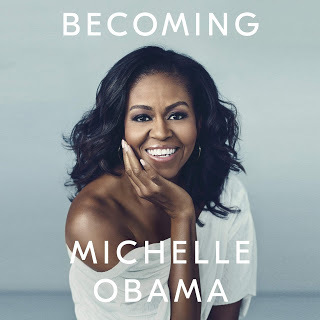
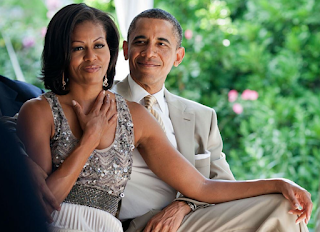
By Shevlin Sebastian
As I was wandering among the racks of the EMS Cooperative Library at Kochi, I saw a thick hardcover book: ‘Becoming’ by Michelle Obama (published in 2018). I checked the memory bank in my brain and realised I had not read any reviews. So, I did what I always do, when I am in two minds about taking a book: I read the first paragraph.
But I did not have to go that far. Her first line immediately caught me with its clarity: ‘When I was a kid, my aspirations were simple’.
Then she continued: ‘I wanted a dog. I wanted a house that had stairs in it -- two floors for one family.’
Michelle kept up this simplicity and honesty throughout the book.
It was an easy and enjoyable read. Women will enjoy it more because it is a woman’s perspective on life, and she writes about how hard it is to balance motherhood and a career. I liked the fact Michelle had no qualms about writing about her lower middle-class background on Euclid Avenue in Chicago. In fact, she was proud of it.
In my career I met too many celebrities who pretended they did not climb the ladder to success. They acted as if there was no ladder. I remember the New Delhi-based wife of a billionaire, who was wearing a large jade ring, and was visibly offended when I asked this question to her in a hotel at Kochi: “Did you ever imagine when you were living a middle-class life before your marriage you would end up becoming so rich?”
The interview went downhill after that. She did not want to be reminded of her roots.
But not all are like that. A friend told me about how American fashion icon Kim Kardashian was publicly grateful to the hotel heiress Paris Hilton. Kim worked as Paris’ assistant and closet organiser over a few years, and, through her, gained international exposure and became a huge fashion brand. Today, Kim’s net worth is over $1 billion.
Just a couple of days ago, I watched an interview with legendary actor Al Pacino with Canadian journalist Herby Moreau where he says frankly that he came from a poor family. And he remembered, with gratefulness, his drama teacher in school who encouraged him to take acting seriously.
For Pacino fans, here is the link to the interview:
https://www.youtube.com/watch?v=XterHqhzC-g
And in Kerala, there is leading businessman Kochouseph Chittilappilly who has spoken publicly about how he would travel around in his scooter in the 1970s trying to drum up business for his voltage stabilisers.
Kochouseph debuted on Forbes' Billionaires list in 2018 with a net worth of $1.2 billion.
I am sure Michelle would have answered the question with sincerity.
When you always remember your roots two things happen. You are grateful for whatever has happened in your life. Al Pacino kept saying how lucky he was. Surely, luck, or the touch of God plays a huge part in a successful career and in life, too.
Secondly, by remaining humble, inner growth can continue to take place. If you want to stay relevant, you have to continue to grow inwardly. Growth should only stop when you die.
If you get puffed up, inner growth stops, because you feel you are a top gun and there is no need to do anything more. This results in stagnation and an inevitable fall from the pedestal.
Back to the book: Michelle traces what it was like to be a black girl growing up in Chicago. She writes about her education in mostly all-white institutions and her work at a law firm where she met Barack Obama for the first time.
Barack was interning with the firm and had been assigned to Michelle. Their love bloomed and it was all very nice to see. But what drew my breath away was the imaginative way Barack proposed to Michelle. ‘Wow,” I thought to myself. ‘Wow, wow, wow.’ Cleverly, he adopted the opposite tactics moments before. He asked Michelle, “Is it necessary to get married?” That got Michelle’s goat, and she argued intensely, like the trained lawyer she was, about how necessary it was if they were serious about their relationship. Michelle also speaks frankly about her life-changing experiences as the wife of a two-term President of the United States.
For this book, I adopted a new way of reading. As soon as Michelle mentioned a name, let’s say, her mentor at Princeton University, I would google the name and read up about that person’s life. This turned out to be very interesting. Many of them ended up working for Michelle when she became the First Lady in 2008.
Moral of story: if you treat people well, especially youngsters, they will remember it and might help you when they reach positions of power.
I remember my chemistry teacher in St. Xavier’s school at Kolkata. A trifle eccentric, he was a good man at heart. In his seventies, when he fell into financial difficulties, the call went around among his former students, many of whom are at the apex of power in many fields in India and abroad (that’s the advantage of a Xaverian education). It was no surprise they collected Rs 35 lakh and gave it to him.
Sometimes, I went to YouTube and listened to a particular speech which Michelle mentioned. All this is very good, but you end up taking a lot of time to finish the book. About half-way through, I dropped this idea and read the book only.
Another problem I am encountering, with alarming frequency, is that after reading ten pages, I get a twitch in my brain. So, I stop reading and pick up my mobile and go online for about 15 minutes to get my ‘fix’. Yes, there is no doubt checking the phone is an addiction.
This is becoming a major problem. We constantly need the mental stimulation that comes from browsing on the mobile. Increasingly, the book, with its bland black text, is getting to be boring. Despite being an intense book lover, it is clear the mobile has damaged me and my brain in ways I cannot yet fathom.
Although it is a fact that the satisfaction one gets from reading a book is deeper, soul-nourishing, and stimulates your imagination far better than scrolling on a mobile phone, the browsing continues non-stop. Surely, the future of book reading is up in the air. Babies born today are going directly to the screen instead of the printed text. Will they be attracted to printed books when they grow up? Who knows?
Expectedly, there are several nice quotes in Michelle’s book, but one caught the eye: ‘Women endure entire lifetimes of indignities — in the form of catcalls, groping, assault, oppression. These things injure us. They sap our strength. Some of the cuts are so small, they are barely visible. Others are huge and gaping. Either way, they accumulate. We carry them everywhere, to and from school and work, at home, while raising our children, at our places of worship and anytime we try to advance.’

